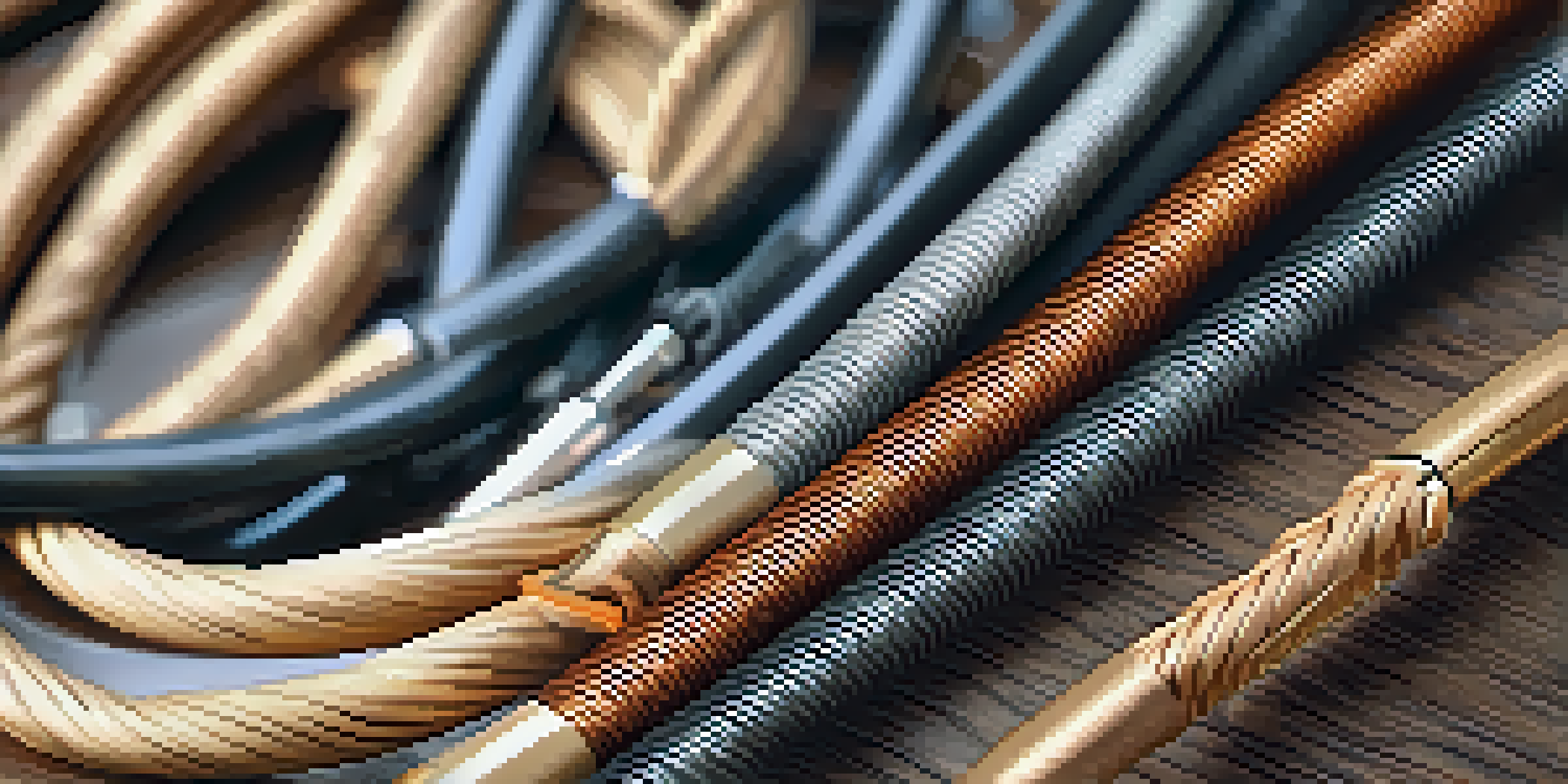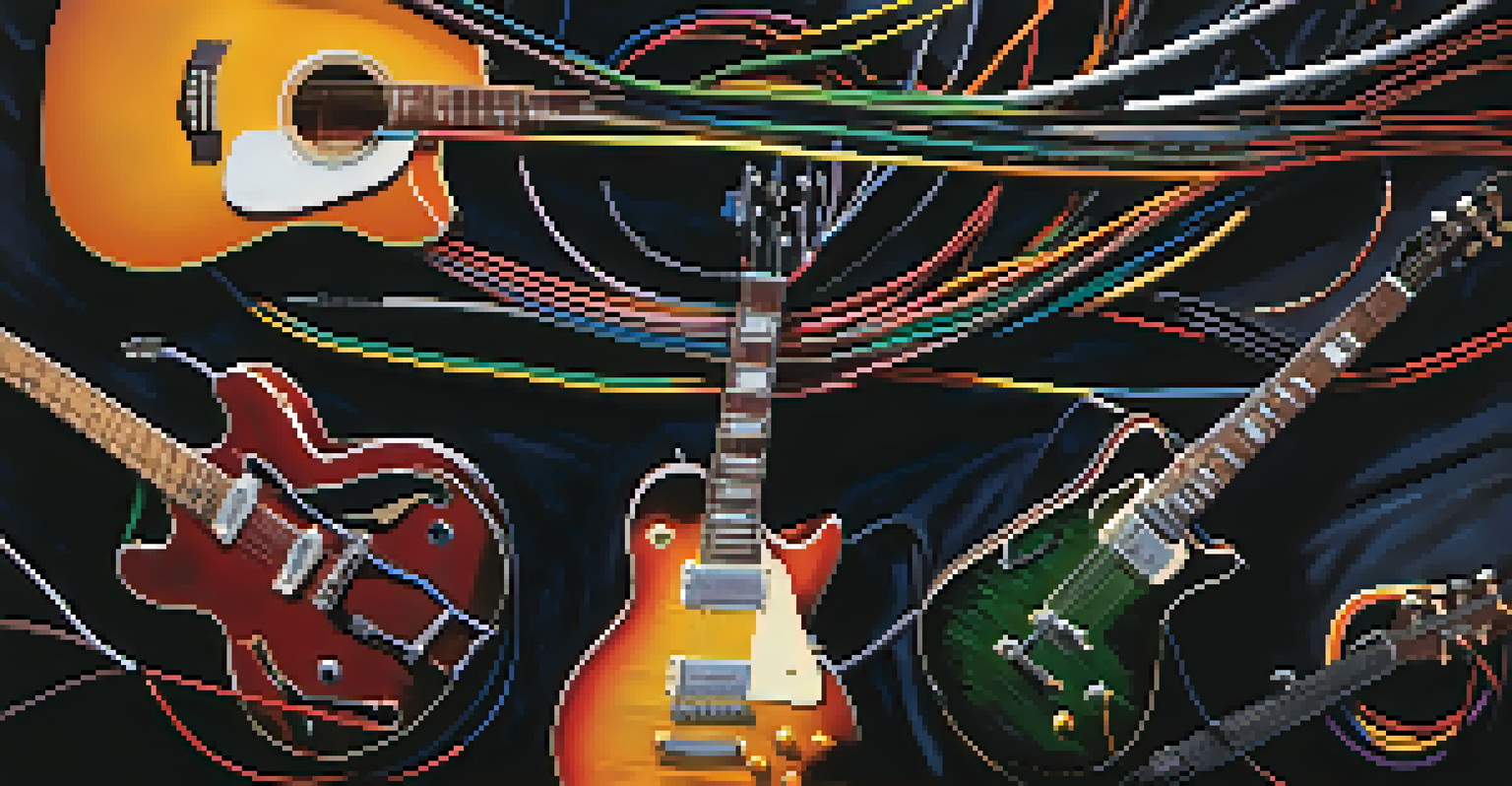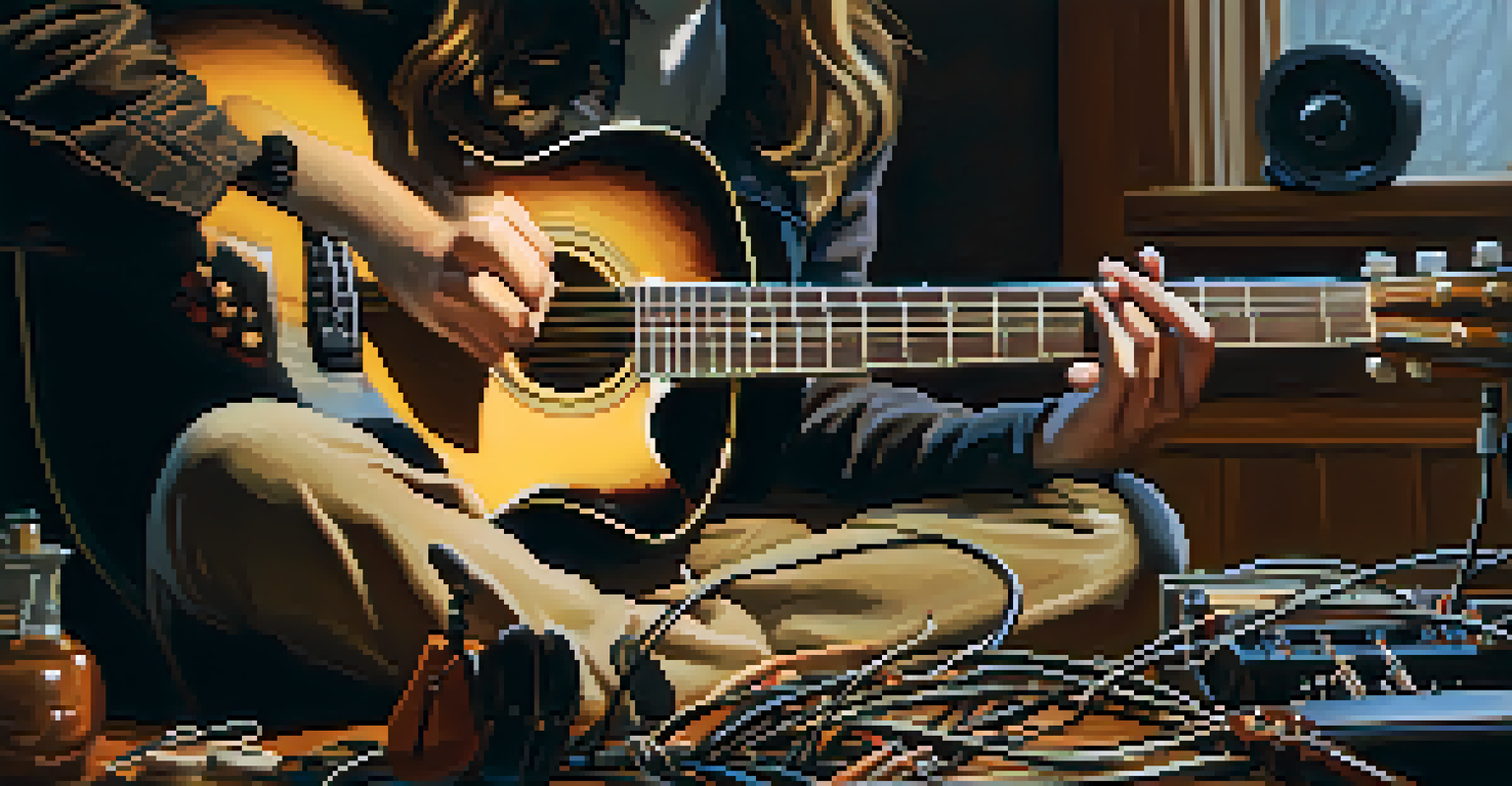Choosing the Right Guitar Cable: Quality and Performance

Understanding the Importance of Guitar Cables
When you think about your guitar tone, the cable might not be the first thing that comes to mind. However, a good guitar cable is essential for transmitting your sound without loss or interference. Just like a painter needs the right brushes, a guitarist needs quality cables to bring their music to life.
A good musician doesn't just play the notes; they know how to use the right tools to amplify their sound.
Think of your guitar signal as water flowing through a pipe. If the pipe is damaged or too small, the flow is restricted, and the quality diminishes. Similarly, low-quality cables can introduce noise or degrade the signal, impacting your overall sound. Investing in a quality cable ensures that your tone remains pure and vibrant.
Moreover, cables can affect your setup's reliability. A broken cable can ruin a performance or practice session, causing frustration and wasted time. By choosing the right cable, you can enjoy peace of mind knowing that your sound will remain consistent and dependable.
Key Factors to Consider When Choosing Cables
There are several factors to keep in mind when selecting a guitar cable. Firstly, consider the cable length. Longer cables can lead to signal loss, so if you’re frequently moving around on stage, look for a balance that allows flexibility without compromising sound quality. A 10-foot cable might suffice for practice, while 20 feet could be ideal for performances.

Another important aspect is the cable gauge, which refers to the thickness of the wire inside the cable. Thicker cables generally carry signals better and are less prone to interference. However, they can be stiffer and less flexible. So, it’s a good idea to find a gauge that offers a mix of durability and flexibility for your needs.
Guitar Cables Impact Sound Quality
Quality guitar cables ensure your tone remains pure and free from interference, much like using the right tools for painting.
Finally, consider the connectors. Gold-plated connectors are often touted for their superior conductivity and resistance to corrosion, which can make a noticeable difference in sound quality over time. So, while they might cost a bit more upfront, they can pay off in the long run.
Different Types of Guitar Cables Explained
Guitar cables come in various types, each designed for specific uses. The most common type is the 1/4-inch TS (Tip-Sleeve) cable, which you typically use to connect your guitar to an amplifier. This is the standard cable for electric guitars and offers a simple, effective connection.
The right cable can make the difference between a good sound and a great sound.
Another popular option is the TRS (Tip-Ring-Sleeve) cable, which is often used for balanced connections. This type can help reduce noise and interference, making it an excellent choice for longer runs or when connecting to effects pedals. Think of it as a way to ensure that your signal stays clean, even over distance.
For those who like to experiment, there are also specialty cables like the stereo 1/4-inch jack or even patch cables for pedalboards. These can give you greater flexibility and options for your rig. Understanding these types can help you make informed choices that enhance your overall sound.
Recognizing Quality Cables: What to Look For
When searching for a quality guitar cable, it’s essential to look at the materials used in its construction. A good cable will have high-quality copper conductors, as they provide better conductivity than cheaper alternatives. Additionally, look for cables with a durable outer jacket that can withstand wear and tear.
Another indicator of quality is the cable’s shielding. Well-shielded cables can minimize interference from external sources, such as radio waves or electronic devices. This shielding can come in the form of braided or foil materials, which act as barriers to unwanted noise.
Choose Cables Based on Usage
Factors like cable length, gauge, and connector type are essential to consider for optimal sound transmission and flexibility.
Lastly, pay attention to the warranty offered by the manufacturer. A longer warranty often indicates that the company stands behind its product. If a cable comes with a lifetime warranty, it’s a strong signal that they’ve invested in quality materials and craftsmanship.
Budgeting for Your Guitar Cable Purchase
Setting a budget for your guitar cable is important, but remember that quality often comes at a price. While it’s tempting to go for the cheapest option, investing a little more in a reliable cable can save you headaches down the line. Think of it as an investment in your sound.
You can find decent cables in the $20 to $50 range that provide good quality without breaking the bank. It's worth exploring different brands and reading reviews to pinpoint the best options within your budget. Sometimes, a mid-range cable can outperform a high-end option, so do your research!
Additionally, consider the long-term costs associated with cheaper cables. If you have to replace them frequently due to wear or signal issues, you might end up spending more than if you had invested in a quality product from the start. So, weigh your options wisely!
Caring for Your Guitar Cables
Once you've chosen the right cable, caring for it is essential to ensure it lasts. Always store your cables properly by coiling them neatly and avoiding sharp bends. This helps prevent internal damage and keeps the connectors from wearing down prematurely.
Additionally, make a habit of inspecting your cables regularly. Look for any signs of fraying, cracks, or loose connectors. If you notice any issues, it’s better to replace the cable before it disrupts your playing. Remember, a little maintenance goes a long way!
Invest in Quality for Longevity
Spending a bit more on a reliable cable can save you money in the long run by reducing the need for frequent replacements.
Lastly, avoid leaving your cables in extreme temperatures or direct sunlight. Heat can deteriorate the materials over time, leading to poor performance. Treat your cables with the same care you give your guitar, and they will serve you well for years to come.
Final Thoughts on Guitar Cables
Choosing the right guitar cable may seem like a small detail, but it can significantly impact your sound and performance. By understanding the different types of cables and what to look for, you can make an informed decision that enhances your overall playing experience. Just as every note counts in a song, every element of your rig matters.
Remember to balance quality with your budget, and don’t shy away from investing in cables that will last. With the right care, a good cable can provide years of reliable service, ensuring that your music shines through without any unwanted noise.

So, the next time you're gearing up for a jam session or performance, take a moment to appreciate the importance of your guitar cable. It's a small yet vital link in the chain that connects your creativity to the audience.